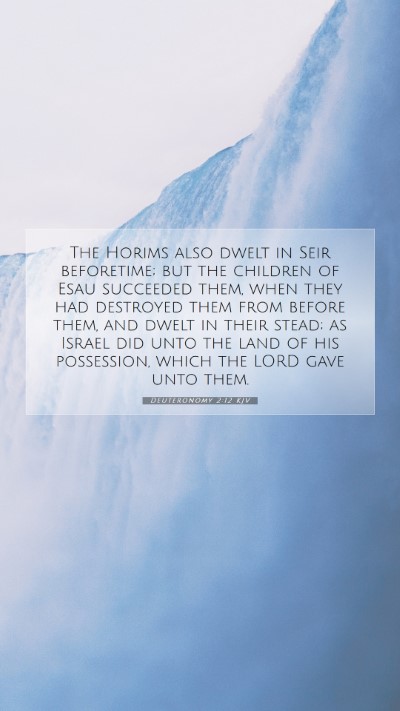Understanding Deuteronomy 2:12
Bible Verse: Deuteronomy 2:12 - "The Horites also dwelt in Seir beforetime; but the children of Esau succeeded them, when they had destroyed them from before them, and dwelt in their stead; as Israel did unto the land of his possession, which the Lord gave unto them."
Bible Verse Meaning and Interpretations
This verse serves as an important historical note regarding the transition of land ownership in ancient Israel. Here we find references to the Horites, a group that originally inhabited the region of Seir, and the children of Esau, who took possession of that land. The implications of this passage go beyond mere history; they convey deep theological and moral lessons related to divine providence, judgment, and fulfillment of promises.
Historical Context
According to Matthew Henry's Commentary, the mention of the Horites illustrates the fact of dispossession that often accompanies God's judgment on sinful nations. The victory of the children of Esau over the Horites emphasizes God's sovereignty in transferring lands according to His divine plan.
Albert Barnes provides insights into the significance of this transition, noting how the narrative serves to affirm Israel's own claims to the land that God had promised to them. Just as the children of Esau replaced the Horites, so Israel would replace the Canaanites.
Theological Insights
From an exegetical standpoint, Adam Clarke sheds light on the covenantal promise that plays a significant role within this text. As Israel is seen to displace the inhabitants of Canaan, parallels can be drawn with how God faithfully fulfills His promises to His people.
Key Themes
- Divine Sovereignty: The events depicted show God's control over nations and their fates.
- Judgment: The dispossession of the Horites serves as a warning against rebellion against God.
- Fulfillment of Promises: God's promises to Israel are reaffirmed as they take possession of their promised inheritance.
Applications to Daily Life
In applying these biblical truths, one can reflect upon how God directs the course of our lives and fulfills His promises in due time. For individuals facing uncertainties, the example of Israel can be a source of strength—encouraging the belief that God is at work, even when circumstances seem bleak.
Key Takeaways
- Understand the historical transitions in the land of Canaan in the light of God's providence and care.
- Recognize the broader theological implications regarding God’s faithfulness and judgment.
- Consider how the lessons of dispossession and possession can inform our understanding of God’s will in our lives today.
Related Bible Verses
- Genesis 36:20-21 - Provides additional context about the Horites and their connection to the Edomites.
- Deuteronomy 2:5 - Discusses God’s command concerning the treatment of other nations.
- Joshua 24:18 - Reminds us of God's faithfulness in driving out nations before Israel.
Conclusion
In summary, Deuteronomy 2:12 enriches our understanding of the biblical narrative by illustrating God's sovereignty and faithfulness in fulfilling His promises. It challenges readers to contemplate the historical and spiritual significance of the unfolding story of Israel among the nations as a reminder of God's abiding presence and divine plan.


